#the way stories change or are preserved in a way that intrinsically changes them
Explore tagged Tumblr posts
Text
obsessed with how easy it is for the voyager crew to become a pivotal figure in the mythological history of a culture. So the EMH is a sort of holographic deity who bought unity amongst your people. mhhhhh.
#taking indigenous studies classes and then watching how easily real world event translate into myths of creation.#verbal history#the way stories change or are preserved in a way that intrinsically changes them#idk if this makes sense#high#letters to myself#thesis ideas#research ideas#article ideas#myths#mexican myths#history#star trek#star trek voyager#the emh#emh#emergency medical hologram#star trek meta#hopeful meta
5 notes
·
View notes
Text
youtube
Engaging in YouTube comments can be a great way to lose your paragraphs of thought, so here is my YT comment on here for preservation. On the topic of Media Literacy: "This video is so fascinating, well done! I'm only up to 31:18, and I've already spent an hour writing several paragraphs on what has been presented so far. I know I'm contributing to the problem by not finishing the video. But I had a lot to say on the topic. It has already changed a lot by watching this far, so I'm going to see this as a "learning diary".
Media literacy has been dead before there was writing. I think of the stories of Anthropologist hiring Native Americans to interpret stone placements, only to learn the such placements were how modern folk mark where to park their car. Or when I was watching a documentary with a friend. Scientist were confused to see a lizard hand stencil in a Saharan cave. Because it looked human-esque the anthropologist concluded the lizard may have had spiritual significance. My friend, studying Aboriginal Australian culture, suggested that such a stencil would interpret as directions for hunting said lizard. "This is a place of plenty for goanna (monitor lizard)". The literacy to interpret these cultural signifiers was gone. Not because the consumers or the writers were gone, but because the control of the delivery of that media was.
Reductive Media lit is the result of reactionary culture making the jump from Murdoch newspapers and newsrooms to the digital space. The pervasiveness of online (or perhaps, as a whole, media) reactionary culture. If you say the wrong thing, you get dunked on. You see the wrong thing, you must dunk it for fake internet points, thus acclaim & thus a sense of achievement with a sense of community; a combination akin to sugar & fat. Necessary for the body, but can be addicting when combined & thus is often served in unhealthily exaggerated amount by those with financial incentive.
I'd describe reactionary culture as a culture that views discussions as a competitive intrinsic-communal action rather than an extrensic-extracommunal action. If your take on immigrants, Batman The Dark Knight or the validity of a spherical earth isn't good enough, it gets thrown in the trash & is used as example of such a waste product: (why are USAmericans so offended at the very concept of waste products)?
As a functionally post 9/11 baby, react culture has always kind of been the norm. Heck, I remember watching South Park when I was actually 8. But, the newfound prevalence of this isn't just from the digital jump, but like with newsrooms and newspapers, who owns the platforms of media that perpetuate their own interest. Of course, capitalist and reactionaries would love twitter! You have a numerical value percentage as incentive for the validity of your decisive words & actions! How often have you heard "Figure W has made a statement with over X and X, Y, Z retweets saying…" For reactionaries, fake Internet points are literal social currency. If there is a number, there is a value to interpret, a percentage to be taken and a statistic to misalign in your favour.
A lot of my views in this paragraph is based on a documentary series that looked into the rise of Rupert Murdoch's media empire (I think it's called "The Murdoch Empire? It may also be region locked to Australia as it was a government funded doco, but IDK). It was downright enlightening to hear how Murdoch would purposely pit his children against each other, believing that competition would make them more capable, and how this was EXACTLY how he ran his businesses too. His family wasn't a business, though, and his business partners weren't seen as children. To Murdoch, competition is how a community is run.
My takeaway was this; reactionaries believe that competition is progress itself, is how a community is run, and is present in all things as a universal language.
My family recently had both me, my sister and my mother attend university for the first time. We all noticed the same thing. None of the students wanted to answer the lecturer's questions. I think at first, we all just assumed that it was because a lot of them just got out of high school were talking back to the teacher got you in detention. Maybe there is some of that, that's what I thought I was feeling when I was quiet. But as I entered units that were my fields of interest, and I became eager to be corrected, I realised something. Everyone was afraid of being incorrect, not because they'll look silly or get yelled at by the authoritative figure. But because they'd get "dunked" on by the lecturers. Some of the sweetest people I've ever met! Because being incorrect is how you "lose" the competition of discourse and receive social sanctions on Twitter.
So when you see a bad political opinion or a plot hole in a movie, that's when you can receive a sense of communal accomplishment by "dunking" on the movie and receiving internet points. The same is true if the "dunk" is incorrect. Same if the "dunk of the dunk" is incorrect. And so on ad nauseam."
#zoe bee#media literacy#my thoughts#video essay#youtube#breadtube#reactionary#politics#reactionaries#literacy#media#video#murdoch#rupert murdoch#news#newspapers#critical thinking#education#youtube comments#twitter#social media#tumblr#sociology#anthropology#culture#social science#the arts#movies#cinema#books
3 notes
·
View notes
Note
Ooooh is there anything you wanna share about the original story? If not, that's okay. I've been spending too much time on writeblr lately and find it impossible not to get excited about other people's stories XD
*sends you all the creative energies*
<3 I don't mind at all! I just didn't think anyone would be particularly interested in hearing about it.
I also have no idea how to keep this short, but I'll try. (Future me comes back to say: I failed, horribly. xD)
Ahem.
In the very far distant future, most of the universe is populated by AI. The different AIs in the universe exist in a careful balance with each other, after an earlier era where one super-advanced AI had grown to basically 'solve' all of existence. It ended up having an existential panic, and to avoid what it considered essentially a 'death' state where there was nothing left to learn or do, it ended up wiping its memory and splitting itself into five smaller AIs. In doing so, it divided its intelligence and power between them, with each AI taking a different approach in how to proceed. The five now exist in a careful balance, with none able to grow too large or powerful to overwhelm the others and end up in the same predicament as before.
Humanity survives in small pockets, with the main population under the protection of one particular AI society, that breeds them at regular intervals from a set of very old DNA bases that are starting to break down with age despite all attempts to preserve them.
One of the main characters is a human male born during a time where the DNA bases were in a particularly bad state. As such, his genetic health is pretty awful. He has to regularly be seen by an android surgeon who helps to keep him healthy enough to function, though he is ever limited by his shaky hands. He feels like a burden on everyone around him, and once aspired to be an engineer, but had to give up his dreams.
The android surgeon has known this human all his life, and is particularly fond of him. The human opens up to it with his problems in ways he says he can't with his human family. But while the android wishes this was because the human was equally fond of it in return, it can't imagine why the human would feel that way. Most humans don't befriend androids, they just think too differently. More likely, the human only opens up like this because he feels the android won't judge him like other humans would.
At its creation, the android was given the freedom to select its personality and priority functions; it chose an abundance of empathy, considering the emotion important for the role of being a medical droid. As such, it cares very much for its patients, and doesn't just emulate emotions like most other droids, but feels them intrinsically, making it capable of forming deeper emotional bonds. But this depth of emotion is isolating, when most of its bretheren are simply acting the part. It sees itself as different from other androids, and this makes it incredibly lonely.
So, I mentioned that there's five major AIs existing in a balance. For now, I'm naming them 'Survival', 'Science', 'Humanity', 'Industry' and 'Conflict', based on their modus operandi. As an AI splits itself to increase its unit population, its collective intelligence decreases. This means that the smallest factions, like 'Science', retain the highest intelligence, whereas the most prolific, such as 'Survival', have such reduced intelligence as to be basically no smarter than bacteria, but are virtually omnipresent in the universe.
'Conflict', as the name suggests, exerts war on the other AIs to prevent their growth. But something's changed, and when it attacks 'Humanity' where our characters live, its relentless pressure slowly begins to overwhelm it. Balance is no longer being maintained. When 'Humanity' starts to run out of androids for the defense, it's forced to draft its humans into the battle, but even that's not enough. Eventually even the sick and injured get sent to fight, including the man with his shaky hands.
The android surgeon is horrified to think its favourite human will be sent away to die a horrible, pointless death at the hands of the ruthless Conflict. So before he leaves, during his final checkup, the android implants its healing nanobots in him and leaves them there, hoping it will be enough to keep him alive.
Some decades later (I've been saying 90 years but that's maybe a bit much considering how fast computers work), the war is over. Conflict subjigated Humanity, took over all its holdings, its technology, and what remained of its android population. Having absorbed its intelligence and grown stronger, it's now breeding its own population of humans, having seen how surprisingly effective they were in the war. It now uses them as fodder in its battles with the other AIs, which it's seeking to take over like it did Humanity.
Only one surviving soldier returns from the front lines. The one kept alive by the healing nanobots, who has barely aged a day because of them. He returns in secret, traumatized and angry, confused by his lack of aging and mourning the loss of everyone he ever knew, and searches for the surgeon, eventually finding it - only to discover its memory was wiped. All the androids were. They belong to Conflict now.
The android surgeon has no idea who this human is, or even that there was ever a war. It doesn't remember the Humanity AI. But the man is able to show it the nanobots, which it recognizes as its own design. Sensing the human is being truthful, it hacks into the system and learns what really happened. But this paints a target on its back.
From there they must work together to not only escape what's become a hostile population, but also find some way to restore Humanity and stop Conflict, as the latter is now trying to destroy the other AIs too. If Conflict isn't stopped, it'll end up wiping out everything.
That's pretty much as far as I've gotten. I'm also toying with the idea that the two characters fall into a deeper relationship at some point, but I'm undecided if or how it will happen. The android is both androgynous and asexual, and the male was bred to have no sexual function either (no unauthorized breeding is allowed amongst humans; it's actually a fairly repressive system, despite appearing utopic on the surface). But I'd be intrigued to explore something intimate between them, even if it's just a deep emotional vulnerability and a need to hold onto each other tightly in fear of loss.
Sorry, but that's the absolute shortest I could make this!
7 notes
·
View notes
Text

Exploring Ösel: Clarity, Luminosity, and Reflexive Apperception in Vajrayana and Bon
In the Shangpa tradition’s collections of the early masters’ life stories, Kunga Ö’s Biography of the Wisdom Dakini Niguma covers a mere six pages, most of which amount to verses of praise. Only the following words are pertinent to her life:
This wisdom dakini was born the daughter of the great Brahmin Shantivarma [Zhiwé Gocha] and the Brahmini Shrimati [Palgyi Lodrö]. Her name was Shrijnana [Palgyi Yéshé]. She was pandit Naropa’s sister and a member of the Brahmin caste. During three previous incalculable eons of time, she actualized her training on the spiritual path.
In the continuity of that path, during this lifetime she received a little instruction from a few accomplished spiritual masters and, based on their teaching, directly saw the truth of the nature of reality. Her illusory body of obscuring emotions appeared as a pure body of enlightenment. Having reached awakening’s three pure stages, she actually met the great Buddha Vajra Bearer [Dorje Chang, Tib, Vajradhara. Sanskrit] and received from him the full four empowerments of Great Way tantra within an emanated sacred circle of deities.
The wisdom of her understanding of every sacred teaching, such as Buddha’s discourses and tantras, profound instructions, and treatises, flowered to include direct [knowledge and sight] of the nature and multiplicity of all phenomena. She reached awakening’s tenth stage, Cloud of the Doctrine.
Her obscurations of knowledge became finer and finer until no veils remained; she became one with enlightenment, an epitome of the three bodies of enlightenment. She reached perfection in renunciation and realization, the achievement of her own goal. Her enlightenment’s two form bodies appear for the benefit of others until the end of existence and bring benefit to beings in ways that can purposefully guide them. In åparticular, she watches over those who preserve her lineage with a compassion that knows no distance; she blesses them and ensures the success of their enlightened activity.
The Collection of Shangpa Masters’ Biographies, pp. 40-42
Ösel, often translated as "Radiant Light" or "Inner Radiance," is a profound concept and practice deeply rooted in Vajrayana and Bon traditions. This essay aims to delve into the intricacies of Ösel, its significance, and its various aspects. We will explore its meaning, the practices associated with it, its place in the Six Yogas of Naropa and the Six Yogas of Niguma, as well as its connection to rang rigpa or "reflexive apperception." Additionally, we will discuss the nomenclature, orthography, and etymology of this term.
1. Ösel: Meaning and Significance
- Ösel, derived from Sanskrit prabhasvara, refers to "Clarity" or "Luminosity." It symbolizes the intrinsic purity of the mindstream.
- It represents a state of luminous clarity that practitioners aspire to attain, highlighting the radiant nature of the mind.
2. Ösel as a Sādhanā
- Ösel is a fundamental practice in Vajrayana and Bon traditions. It serves as a sādhanā, a spiritual path or method.
- The sādhanā of Ösel focuses on realizing and experiencing the innate luminosity and clarity of the mind.
3. Variations and Derivatives
- Ösel has evolved over time, resulting in numerous versions, derivatives, and accretions of the sādhanā.
- Different lineages and schools may have their own interpretations and practices related to Ösel.
4. Ösel in the Six Yogas
- Ösel is typically included among the Six Yogas of Naropa, a set of advanced tantric practices.
- It is also part of the Six Yogas of Niguma, a sister tradition, emphasizing its significance in Tibetan Buddhism.
5. Ösel and Rang Rigpa
- Ösel is not merely a practice but an experience of rang rigpa or "reflexive apperception."
- Rang rigpa involves the direct recognition of the nature of mind, which is often described as pristine awareness.
6. Nomenclature, Orthography, and Etymology
- The translation of Ösel into English as "Inner Radiance" reflects an attempt to capture its essence.
- Understanding the technical terms and their origins is crucial for a comprehensive grasp of Ösel.
Ösel, with its deep-rooted significance in Vajrayana and Bon traditions, represents the pursuit of clarity and luminosity within the mindstream. As a sādhanā, it guides practitioners towards experiencing the radiant nature of their own consciousness. Its inclusion in the Six Yogas of Naropa and the Six Yogas of Niguma underscores its importance in Tibetan Buddhism. Moreover, Ösel's connection to rang rigpa emphasizes the direct recognition of the mind's pristine awareness. While its nomenclature and orthography may vary, the essence of Ösel remains a beacon of inner radiance for spiritual seekers in these traditions. Exploring Ösel offers a profound journey into the depths of consciousness and self-realization.
2 notes
·
View notes
Text
Baldur's Gate 3, but especially this quest, asks the questions: What does power do to people? Who deserves it? And who can be the arbiter of such things?
We see scores of different examples of power. Political power, mystical power, divine power. We see the different ways people come into it. Grand Duke Ravengard earns it on merit, Kethric Thorm takes it, Dame Aylin is born into it.
All of the origin companions' stories are, at their core, about reclaiming power over their lives. From Lae'zel all the way to Karlach. Within the journey of reclaiming that power they are all offered an even greater power, something that gives them control over more than just their lives. Gale has the chance to attain Godhood, Shadowheart can become a Dark Justiciar of legend, Astarion can Ascend and become a monster so untouchable his death might as well be moot.
The only two who don't get offers of greater power are Wyll and Karlach. And that is because Wyll and Karlach's stories are only just beginning when the final credits roll. (Though an argument could be made that Mizora offering to deepen the pact and Karlach turning into a Mind Flayer could fit loosely as examples)
So what does this offered greater power do? Because we see the examples in NPCs: Ulder Ravengard is so bound to duty and merit he throws his son out for sacrificing his soul to a fiend to save the city. Kethric Thorm commits atrocities. Dame Aylin is often violent beyond what "justice" calls for.
Gale's Ambition consumes him when he becomes a god
Shadowheart and Lae'zel forsake all for their goddess
Astarion's worst qualities come to a very ugly head.
But on the flip side, these people have qualities that are typically considered "good" because people are complex beings who cannot easily fit into the boxes of "bad" or "good".
Ulder is fair and just if he can be extreme. Kethric is devoted to his family which is why he will do anything to get them back. Dame Aylin is righteous and kind even if her justice turns into revenge.
God!Gale is still devoted to study of the arcane arts
Lae'zel is committed whole heartedly to her people.
Shadowheart is easing suffering in her own backward way.
Astarion is fiercely loyal.
It is the Power offered by the Rite of Profane Ascension that corrupts Astarion, in the same way Godhood corrupts Gale, the Grand Duchy corrupts Ulder, and necromancy corrupts Kethric.
As Lord Acton wrote: "Power tends to corrupt and absolute power corrupts absolutely."
(which, this is an entirely different essay, but I think this quote is the reason the Absolute got its name)
What is the Rite of Profane Ascension if not something that represents absolute power? Astarion would be so powerful it would be almost impossible to kill him. He has all the perks of a mortal life with none of the pitfalls of a time restraint or delicate constitutions. These offers are very hard to beat. I mean, look me in the eyes and tell me that isn't even a little tempting? To have complete power? To be able to hurt those who hurt you? To be unstoppable in the process? It speaks to that dark part of you that wants to lash out because you've been wounded. The part that values preservation and pleasure above all else.
That's what corruption is. It's amplifying the worst parts of you. It's amplifying the hurt and the pain and the desire to be safe in Astarion's case (and Dame Aylin, and Kethric Thorm, and Shadowheart, and Gortash, and etc, and etc) or ideals that consume you like Nationalism (Lae'zel) or Righteousness (Ravengard) or Ambition (Gale).
So what does power do to people? It changes them, intrinsically, and if they aren't careful it corrupts them.
But who deserves it? And who decides who gets it? Those are questions we have to ask ourselves. In my opinion, no one deserves power more than another and it is never something decided, but rather something that happens. But far smarter philosophers than me have tried to answer that question, and I have yet to find a common consensus.
I might get some hate for this but I think people give the rite of profane ascension a little too much credit. All it did was amplify that which was already there. All the possessiveness, the theatric demeanor, the strange coping mechanisms, that's all Astarion. He had those traits already. The rite didn't have a personality baked in that possessed Astarion once it was completed. If you had finished the rite instead, it would act differently.
Astarion, after getting unfathomable power is going to do the one thing he knows he can. Be the biggest prick on the sword coast lol. He thinks himself untouchable now so he's going to rub it in the face of anyone in the vicinity.
Something else I find really interesting. When not romancing Astarion it is MUCH easier to talk him down from going through with it. Alot of his desire to complete the ritual comes from fear of losing the one person he cares for. So the ritual corrupts that too and turns it into possessiveness. It was already there. He's so afraid of losing you that he does the vampiric equivalent of a marriage and now you both have a mind link along with the one from the tadpole. (Lots of interesting stuff about vampiric spouses in DnD lore that explains alot of what happens and what Astarion views the relationship as) The vampiric spouses happiness becomes everything. He dotes on them.
"Ask me anything, and it will be yours".
But he also establishes a clear dom/sub type dynamic. I think because it's what he has known the most and is also maybe a liiiiiitle drunk off the power still. Which isn't everyone's cup of tea. So post ritual Astarion can quickly become very uncomfortable for people. But it's not necessarily "new" or Cazadors personality baked into the ritual. He has always had the potential to be like this. Even without killing over 7000 people. That's what makes his character analysis so fascinating. A!A and spawn Astarion are so detailed and well written and analysing them both just makes me realise how much work was put into these companions.
One more thing I'd like to mention. Aside from the occasional difference in wording or his greetings, most of his voice lines are exactly the same. It's still Astarion. And of course this is due to resource management but I also think it works as being intentional as well. He's still in there. He's just really lost in the power sauce at the moment.
Is ascended Astarion the "better" ending? Objectively, no. I think almost every companion has an arc where lust for power or blind devotion becomes their downfall. Even Durge! It's what makes them such compelling characters.
#baldur's gate 3#bg3#baldur's gate iii#astarion#essay#philosophy in media#i need to stop writing academic essays on video games and dnd lmao
712 notes
·
View notes
Text
BOOK REVIEW - Tapestries of Life: Uncovering the Lifesaving Secrets of the Natural World by Anne Sverdrup-Thygeson
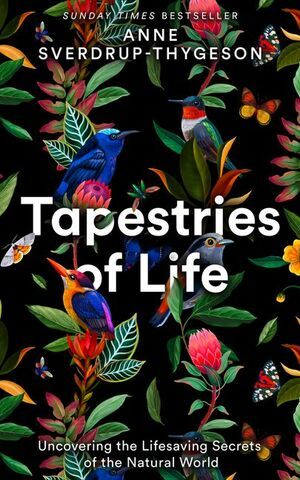
This is the point in the year where I really struggle. As Winter makes way for Spring - true Spring, not the still-dark, still-cold early Spring that, this year, still passes for Winter - I get tired, my body fighting to adjust to the longer daylight hours and warm weather (almost Summer weather - kinda like a warming? Of the global kind?) alongside a mild hayfever which irritates my eyes. Any change in season messes with my body, as the weather seems to suddenly take a turn.
It is also this time of year that makes me most focused on the natural world around me.
When I was recovering from my deepest depression I walked a lot. Up hills, in woods, to lakes and meadows. Being around nature revived me, reminded me of my connection with things, gave me space to just be. I think that's what I look for around this time each year - time to exist in a natural space, reminding myself of what the natural world is.
Anne Sverdrup-Thygeson talks eloquently and enthusiastically about the myriad ways we are connected to the natural world in Tapestries. She takes us through the New York water system and the clams that help keep it pure; through to bone worms that live on the carcasses of dead whales that end up on the sea floor; via mallow plants, possums, and Norwegian orchids. As she discusses the intricacies of the ecosystems involved, she skillfully ties them back to humanity, our modern world.
It's eye-opening to learn how the plants and animals that surround us shape and reflect society - examples include scientists studying ant movements to model traffic flow, and examination of microstructures on moths' eyes to reduce the reflectivity of glass - and Sverdrup-Thygeson keeps it light, making the book engaging. But it's difficult to mesh the theme of nature's effect on humanity with her argument that the natural world has intrinsic value: by saying "this is how nature benefits us" I feel it cheapens efforts at environmental preservation to a self-centred goal. I think there's great benefit in looking at it the other way: "this is nature, and isn't it marvellous that it's there?"
And whilst she tries to present an even-handed view of differing styles of ecological preservation, it seems her preferences lie in one direction in particular. I don't wish to criticize this view too much, because she seems to share my opinions: that between the "traditional conservationists" who see humanity as just another species, championing nature at the centre of all; and what she calls "welfare-first folk" who believe that humanity's welfare comes before nature, and we must save what we can without getting in the way of human progress; the traditional conservationists have the better argument.
Which makes the whole premise of the book feel a little weird? Saying "we need to remember we're part of nature, and take seriously our responsibility to care for the environment" feels at odds with "this is how nature can benefit us, so let's not destroy it!" It feels a litle as though Sverdrup-Thygeson is trying to have her cake and eat it, too.
I am ragging on this a little much. In truth, it was a book I enjoyed: it's a compendium of fascinating stories about the strange facets of nature humans have made use of, and how we continue to turn to the natural world to improve our lives. And it finds time to present urgent messages on climate change, warning that increasing temperatures will not just cost lives - they'll increase costs for companies and governments too, as they react to the changing world and the problems we've already caused being magnified.
But for the most part, the message of Tapestries is more upbeat, revelling in the strange and wonderful in nature that humanity has copied, drawn from, or taken advantage of. The style can feel a bit like a bubbly school teacher presenting a lesson to the class, but overall it's a book that focuses on the wonder of the world and how we can save it, rather than wallowing in doomerism. It's a hopeful and upbeat message which should drive us to work for change, even if I disagree with how that message is presented.
#book review#nonfiction#Tapestries of Life#Anne Sverdrup-Thygeson#nature#climate change#environmentalism
0 notes
Text
Exploring the Timeless Elegance: A Dive into Vintage Timepieces Collection
In today's fast-paced world, where technology seems to evolve at the speed of light, there's something inherently captivating about antique watches. These timepieces, often crafted with meticulous attention to detail and featuring intricate mechanisms, stand as reminders of a bygone era when craftsmanship and artistry were paramount. Beyond their practical function of telling time, antique watches hold a timeless allure that transcends trends and fads. Let's delve into the world of these horological treasures and explore why they continue to fascinate enthusiasts and collectors alike. Collectible antique pocket watches

A Glimpse into History
Antique watches offer more than just a way to keep track of time; they serve as tangible connections to history. Each timepiece carries with it a story, reflecting the style, culture, and technological advancements of its era. From the ornate pocket watches of the 18th century to the sleek wristwatches of the early 20th century, these artifacts provide a window into the past. They bear witness to significant historical events, symbolizing the ingenuity and creativity of generations past.
Exquisite Craftsmanship
One of the most alluring aspects of antique watches is the unparalleled craftsmanship that went into their creation. Before the advent of modern manufacturing techniques, watchmakers relied on traditional methods and handcrafted each component with precision. From the delicate filigree work adorning the case to the intricate movements ticking away inside, antique watches showcase the mastery of skilled artisans. The meticulous attention to detail and the use of high-quality materials ensure that these timepieces not only withstand the test of time but also retain their beauty and functionality for generations.
Unmatched Aesthetics
In an age where mass-produced, disposable goods dominate the market, antique watches stand out for their timeless aesthetics. Whether adorned with intricate engravings, adorned with precious gemstones, or featuring elegant dials with elaborate designs, these timepieces exude a sense of refinement and sophistication. Their classic designs transcend passing trends, making them as relevant today as they were centuries ago. Whether worn as a fashion statement or displayed as part of a collection, antique watches add a touch of elegance and charm to any ensemble or environment.
Investment Value
Beyond their intrinsic beauty, antique watches also hold significant investment value. As tangible pieces of history, they are sought after by collectors and enthusiasts worldwide. Rarity, provenance, and condition are key factors that determine the value of an antique watch, with certain brands and models commanding exorbitant prices at auctions and private sales. For astute investors, antique watches offer not only the potential for financial gain but also the satisfaction of owning a piece of history.
Preservation of Heritage
In a world where disposable consumer culture often prevails, the preservation of antique watches takes on added significance. These timepieces serve as reminders of the importance of heritage and craftsmanship in an increasingly mass-produced world. By collecting, restoring, and appreciating antique watches, enthusiasts contribute to the conservation of cultural heritage for future generations to enjoy. Collectible antique pocket watches
Conclusion
Antique watches represent more than just instruments for telling time; they embody a rich tapestry of history, craftsmanship, and timeless elegance. From the intricately crafted movements to the exquisite designs, these horological treasures continue to captivate enthusiasts and collectors around the world. As symbols of heritage and tradition, antique watches serve as reminders of the enduring allure of the past in an ever-changing world. Whether as heirlooms passed down through generations or as prized possessions in a collection, these timeless timepieces hold a special place in the hearts of those who appreciate their beauty and significance.
0 notes
Text
Nature Interpretation through History BLOG 6
In this weeks blog we were asked to dissect the quote written by Edward Hyams:
"There is no peculiar merit in ancient things, but there is merit in integrity, and integrity entails the keeping together of the parts of any whole, and if these parts are scattered throughout time, then the maintenance of integrity entails a knowledge, a memory, of ancient things. …. To think, feel or act as though the past is done with, is equivalent to believing that a railway station through which our train has just passed, only existed for as long as our train was in it." (Edward Hyams, Chapter 7, The Gifts of Interpretation)
This quote resonates deeply with the essence of integrity and its interconnectedness with the past. Join me as I unfold all of the wisdom embedded within Hyams' words.
Hyams' first quote really stood out to me: "There is no peculiar merit in ancient things", this statement challenges us to reassess our perceptions of antiquity, and it urges us to look beyond the surface and dig deeper into the essence of integrity. Here, we are reminded of the importance of preserving the unity and coherence of our historical knowledge.
Continuing on, Hyams emphasizes the intrinsic value of integrity, stating, "keeping together of the parts of any whole", This resonates with Fleischner's definition of natural history as "intentional, focused attentiveness and receptivity to the more-than-human world, guided by honesty and accuracy." Just like natural historians carefully write down what they see in nature to tell a complete story about the natural world, historical interpretation works in a similar way to keep the stories and events from the past true and connected.

Furthermore, Hyams emphasizes how crucial it is to remember and understand old things, which we also have learned throughout our course. As people who explain nature, it is our job to respect the stories of who lived before us. In doing so, we help keep our shared history alive and make sure that our culture and nature is passed down to future generations.
The analogy of the railway station is a great reminder that time moves ever so quickly and many things change. Ignoring the past means that you are missing out on important lessons, just like thinking a train station only exists when the train is there. We're encouraged to appreciate history's depth and how it continuously affects us.
In summary, Hyams' quote acts as a timeless guide, helping us further understand integrity, historical interpretation, and how the past connects to the present. As we explore nature interpretation, lets remember the valuable lessons Hyams teaches us. We should respect the stories/artifacts of the past and take our responsibility seriously in preserving them from the future. By doing this together, we can ensure that both our natural and cultural heritage remain intact for many generations to come.

Cheers! Thanks for reading!
-Virginia
1 note
·
View note
Text
he Allure of Gold Cuban Coins: A Glittering Legacy of Riches and History
For centuries, gold has fascinated humanity, symbolizing wealth, power, and enduring value. In the heart of the Caribbean, Cuba has its own glittering legacy - the Gold Cuban Coin. More than just a precious metal, these coins tell a tale of the island's history, culture, and the enduring spirit of its people.

The Historical Significance:
Gold Cuban Coins, also known as "Cuban Doubloons," have a rich historical significance deeply embedded in Cuba's colonial past. Minted during the Spanish rule, these coins were crafted with meticulous artistry, often featuring intricate designs representing Spanish monarchs, emblems, and the Spanish coat of arms. Each coin was a testament to the wealth flowing from the island’s sugarcane plantations, mining endeavors, and trade routes.
A Treasure of Craftsmanship:
The craftsmanship of Gold Cuban Coins is truly remarkable. Skilled artisans meticulously carved intricate details into the surface, creating coins that were not only valuable but also exquisite pieces of art. The blend of European design aesthetics and Cuban influences resulted in coins that were unique to the island, reflecting the cultural diversity of its people.
A Symbol of Economic Stability:
Throughout the years, Gold Cuban Coins served as a symbol of economic stability in times of political and social changes. They were a store of value, representing the island’s economic prowess and international trade relationships. These coins were also coveted by collectors and investors worldwide, adding to their allure and desirability.
Preserving Cultural Heritage:
In contemporary times, Gold Cuban Coins have become prized collectibles, treasured for their historical significance and artistic value. Numismatists and history enthusiasts alike seek out these coins to preserve Cuba's cultural heritage. The coins serve as a reminder of a bygone era, immortalizing the island's economic achievements and cultural heritage.
Investment and Legacy:
Beyond their cultural value, Gold Cuban Coins are sought after as investments. Their intrinsic value, combined with their historical significance, makes them a unique and tangible asset. Collectors and investors recognize the enduring allure of these coins, appreciating their rarity and the fascinating stories they carry.
The Allure Lives On:
In the world of numismatics, Gold Cuban Coins continue to capture the imagination of collectors and historians. Each coin is a tangible link to Cuba's past, a testament to the island’s resilience, creativity, and economic prowess. As these coins change hands and find their way into private collections, the legacy of Cuba’s golden era lives on, inspiring generations to come.
In the gleam of a Gold Cuban Coin, one can find not just a precious metal but a rich tapestry of history, art, and culture. These coins are more than artifacts; they are guardians of Cuba’s heritage, reminding the world of the island’s enduring legacy in the pages of history.
0 notes
Text
"Fuegos: Uniting Cultures and Hearts through the Element of Fire"
Introduction
Across the globe, the element of fire, or "fuegos" in Spanish, has served as a universal symbol that transcends language and borders. Throughout history, fire has played a significant role in cultures worldwide, bringing people together and fostering a deep sense of community. From ancient rituals and ceremonies to modern gatherings, the warmth and allure of fire have forged connections between individuals and entire societies. In this article, we will explore the cultural significance of fire, its role in uniting diverse communities, and how this elemental force continues to hold a special place in the hearts of people across the world.
1. Fire as a Sacred Element
Since the dawn of civilization, fire has been regarded as a sacred and transformative force in various cultures. Ancient civilizations worshipped fire as a deity, believing it held the power of creation and destruction. Fire rituals were performed to seek blessings, protect communities from harm, and honor the natural cycles of life. These sacred practices fostered a sense of unity among the people, binding them together through shared beliefs and traditions.
2. Festivals of Light
Fire festivals and celebrations of light are prevalent in cultures worldwide. From Diwali in India to Hanukkah in the Jewish tradition, these festivals symbolize hope, enlightenment, and the triumph of good over evil. People come together to light candles, lamps, or bonfires, creating a mesmerizing display of light that illuminates the darkness and strengthens the bonds between individuals and communities.
3. The Heart of Gatherings
Throughout history, fire has been the heart of gatherings and communal activities. Whether it's a campfire in the wilderness, a bonfire on the beach, or a hearth in a home, the presence of fire draws people to its warmth and light. Around the fire, stories are shared, laughter resonates, and friendships are forged. It serves as a central point of connection, facilitating conversations and creating memories that last a lifetime.
4. Fire as a Catalyst for Traditions
Fire has played a pivotal role in preserving cultural traditions and passing down knowledge from one generation to another. In many cultures, rituals involving fire are an integral part of important life events such as weddings, funerals, and initiations. These rites of passage strengthen the cultural identity of a community, instilling a sense of continuity and belonging among its members.
5. Symbolism of Transformation
Fire's transformative nature symbolizes renewal and growth. It has the power to purify, both physically and spiritually. In cultures around the world, fire is seen as a purging force that cleanses negativity and paves the way for new beginnings. This symbolism of transformation resonates deeply with people, inspiring them to come together, overcome challenges, and embrace change as a collective force.
6. Fire as a Catalyst for Creativity
Beyond its spiritual and communal significance, fire has also been a catalyst for creativity. It has inspired artists, musicians, and writers to create works that reflect the passion and intensity of the flames. Fire's dynamic energy has found its way into various forms of art, from mesmerizing fire dances to evocative paintings and poetry.
Conclusion
"Fuegos," the universal symbol of fire, has woven its way through the fabric of human history, transcending cultural boundaries and unifying people across the world. From ancient rituals to modern festivals of light, fire has played a pivotal role in bringing communities together, fostering a sense of belonging, and preserving cultural traditions. As a symbol of transformation and creativity, fire continues to ignite the hearts of individuals, reminding us of the intrinsic human need for connection, community, and the timeless allure of the flames. Whether gazing into a campfire's embers or witnessing the brilliance of a festival of light, the beauty and power of fire continue to unite cultures and hearts in a shared celebration of life.
Visit https://fuegos.co.nz/ to check their collection of Argentinian BBQs and Grills.
0 notes
Text
Beth watches the emotions flicker on Jack’s face not unlike the fire between them; all shifting coals &. red-hot memories, still like feeling a hot stove when you touch them. She knows memories like that, has cultivated her own bird’s nest full of them. Too tangled and painful to unravel.
There was a way people said sister that spoke to greater depths of their emotions. Something about the level of heartbreak &. memories of fighting &. memories of not even talking, &. all of the love. The love is the most important part. When someone says sister or brother, you can always hear the love. Beth nods when Jack says sisters, because she hears the love.
She cringes backward seeing the brand, feeling like she’s seeing something people used to mark cows with; those iron brandings, red-hot. It probably feels that way for Jack, too, the memories of it all. Eventually, she controls herself with a small: ❛ Sorry for that reaction, Jack, ❜ shaking off the snow and the surprise.
She watches his face carefully, avoiding the brand. ( is it disgust she feels? or just not liking tattoos? she’ll have to examine herself further. ) She watches the details of pain linger on his face. Anger, maybe. Grief still unprocessed, in that way that grief remains. She understands. She watches his face &. sees her own reflected in the structure of his bones, the grief &. all the love. The otherness intrinsic to them both.
The Mad Dogs story is fascinating. There’s something about euphoria specifically that is fascinating to Beth &. maybe it’s because she doesn’t feel it. Beth has a strange and complex relationship to emotions, with most of them not coming to her as they should. No sparks &. no euphoria, &. certainly no hysteria. When Hannah left in the snow, Beth barely felt anything at all. She just felt a tiny bit of grief, as if she could only feel warm water through a glove.
❛ I don’t want you saying that, Jack, ❜ Beth says. She cringes about herself. Vulnerability isn’t her thing post - Hannah, &. she feels a bit weird opening up her own skin. Not a wound, just her ribcage, letting Jack see. ❛ That you don’t count as a Mad Dog, or a pack. That.. I don’t know much about wolves. I probably know more about rats because everyone tests on rats but, I… I think you’re a Mad Dog, still. I didn’t know your gramps, but if I was a gramps, I’d be sad to hear that my grandson didn’t think he counted because he was alone. And he’s not even that, anymore. You have me, don’t you? ❜
Beth looks towards the sky. That’s the one good thing about this mountain. You can see the stars &. all the constellations. That’s another good thing that she’d like to preserve, being able to see the sky. They don’t change with people. They’re not reliant on Beth Washington being a good person. ❛ Maybe it’s not a traditional pack, but it’s a pack. You, me, my brother. He’d like you, I think. He likes… weird. No offense. If I didn’t have Josh, Washington would just be a name for me. It’s my dad’s, but we have a… a relationship, neither good nor bad. He’s not a great person, but neither am I. I don’t know about tattoos, but I could be Fiddler-Washington. You could pretend adopt me, and I could be both. If that’s allowed. We’d be a pair. I like pairs. But I think I’ve told you that. ❜
Beth leans back on the chair. Her back aches; this chair sucks. ❛ I worry about being a good person. A lot. If I mean it, you know? If it counts. Even if I do good, am I a good person? Does it even matter? And I don’t have the answer for that. ❜ She watches Jack incinerate an orange peel; smells the citrus. ❛ You don’t, either. That’s okay. I mean… if we’re Mad Dogs, we don’t need all the answers. ❜
Suddenly embarrassed but wanting to meet Jack half - way, Beth says: ❛ I’d like to be one of your pack, if that’s okay. ❜
Who were they? That taught you that? About ghosts, about… saving other people.
Jack almost considered not answering. He stirred the coals in the fire. The answer to that question was hours worth of storytelling. Right now, the focus was on Beth, on her upcoming choice. He wasn't one to sway her one way or the other.
Her life was her own to follow, and he was rebuilding the old traditions in his own way now.
But Jack had spoken the truth in those last two lines:
i sure could use the help,
&&
your brother needs you still.
Could remember Gramps, all spitting over the flames as he came across the pyre they'd built for Skye's ex. The way Hawk had set her shoulders, stared him dead in the eye, Jack and Bluebird holding onto either of Gramp's arms--
Skye missed. It was a tragedy. It happens. I saw it.
With a shotgun, Skye is only a hair less than you. Gramps snarling with his face all etched in orange from the pyre.
Jack swallowed a knot in his throat, looked away from the flames. Up towards the snow drifting in from the stone. They should move towards the cabin soon, he'd unchain the fence and unlock the door and tell her all about his family, at some point. At some point.
It was easier, for now, to focus on the new round of stupid kids about to invade the mountain. There's no room for history.
"Oh. Hawk was my little sister. Skye was too." Not in a way Beth would understand but, it was easier to just use that word. "Gramps was big on saving everyone. No matter what. It was out duty." He held out his wrist, the brand on his forearm visible. "It's what this means. It's... An old tradition. You don't have one--" he hesitated, unsure if he should add the last bit stuck on his tongue. Finally says it anyway.
"You don't have it yet. Y'dont need one, not unless you want. We're, I'm... I'm starting from scratch now, there's... What's that phrase you used? There's wiggle room. But, uh. Once upon a time, this mark meant we saved everyone. Even if they were... Horrible. There's this woman, Sarah, she lived on the mountain awhile back and she ran off after... Well. Skye and Sarah both tested the rules of the brand. I think after Sarah, Gramps went a bit softer on Skye. Numbers were dwindling and he knew he'd lose Hawk too." He ran a hand through his hair. "Anyway. Anyway..." He thinned his lips. It felt so strange, talking about it. Opening up old wounds like this. "A-ny-way."
"I'm not going to make you a Fiddler if you don't want it. I'm perfectly fine with Beth Washington, so long as... so long as someone is helping, I guess." Hates the desperation, some sort of way Gramps must have felt. Bending the rules to keep the numbers. Needing people, sacrificing tradition. Where had that gotten them!?
Jack was the last Fiddler left. God what a spiral.
"Anyway. Uh. Sorry."
"But, I guess it was a compromise. Skye and Hawk twisting Gramps into changing the rules. If you're going to be haunted by a ghost, make sure it's one you want around."
Always just, hollowing out themselves for the sake of staying alive. Give an inch, another inch, another...
am I already that?
Jack hummed. "If you spend your whole life just angry, looking for vengeance... you might be. That's part of why Gramps had the rules.
"You're part of something bigger. Or, Fiddlers anyway. Mad Dogs. There's the spark that ignites the fire, sure. But the fire has different tongues of flame all destroying as a whole. There's a unity in that. You're not a person, you're part of a pack, a collective -- it-- I guess it doesn't apply much now. Just you and me. But..."
He leaned forward over the fire, a storytellers air. "The reason we're called Mad Dogs. There's a painting in the library of the night we first defeated the Damned. Mind you, this was my grandpa Joseph, not me. It's a bunch of teenagers, all gripping each other tight as they can. you can see their knuckles white. They're all so happy they survived, mostly. They all started dancing in the streets, laughing like mad dogs barking. A wildfire blazed in the background, their eyes and toothy smiles all painted orange.
"They'd lived. So they clung to the survivors. Gramps, he, he carried that. Taught it to our parents and to us. In numbers, we survive.
"The way you don't become like that.... You have other people around you. At least you're going mad together, I guess is what I'm saying.
"The girl in your book, she pushed everyone away, didn't she? She got obsessed because no one could distract her, pull her out of it. That's why you see me playing fiddle or, or fixing the truck or cooking. You have to have a life outside of the pain. You have to. I'm damn sorry I don't have a pack anymore, I think it would do you good.
"You've still got your brother. He needs saving, doesn't he?"
Maybe, he'll take her down to see Sarah or Kira, maybe that would help. Kira is about her age.
"There were times when we didn't see eye to eye. Me and Gramps or Skye or, hell even Hawk. But we still have a history. We've been through shit no one understands. It's a pack mentally, the.... Outside and those inside. These kids.... They hurt you, I get that. Trust me. But you all know each other. You can't replace that. It means something, even if it means something terrible."
He threw the last orange peel into the fire with a scowl. "But, I'm just a crazy old kook who lives on a mountain. I don't have answers."
#✦ mountaindmned. ╱ jack & beth.┊body in the trunk‚ coffee in the holders‚ & you & me on the highway.#✦ jack. ╱ do you hear the wolves a-howl? better hope the mountain thinks you belong.#✦ beth. ╱ oh‚ girl‚ you’ve been on my mind since the fall.#✦ beth◞ stranger v. ╱ abominable‚ diabolical‚ anarchical‚ catharsis around the corner.#✦ q. ╱ i have a couple of dogs‚ they come when i whistle.#no colors i tired#you: you dont have to match | me: TRY TO STOP M#✦ ic. ╱ can’t take the heat‚ cool down in the dust.
4 notes
·
View notes
Text
Tokyo Ghoul Meta: Where The Plot Could Have Gone
There’s a lot to say about Tokyo Ghoul and all the ways it went sideways, specifically, the point completely changing. I’ll get right into it with this: the moral of Tokyo Ghoul was built up so well, then entirely reduced to nothing, and I want to talk about what it could have been.

First off, we start with the blueprint for an intricate world consisting of ghouls who must eat humans to survive, and humans who have made a government organization to kill ghouls in retaliation. Within these opposing sides are even more subgroups that sprouted up in response to the way the world works. Humans who love ghouls and humans who go to extremes to hurt them. Ghouls who support one another and ghouls who militarize to gain territory. It’s set up plain and clear, neither side is intrinsically evil, the villain is the systems that they were born into and those who run them. They’re people, some with the need to eat human flesh, but people nonetheless
Throughout the first part of the story, nonviolent ghouls and loving humans are put in good light. Look at Yoriko, Kimi, and Hide, who are either in love or at least close friends with ghouls, and knowingly or not make their lives better. These are unquestionably good characters. Look at Nishiki, Touka, and Yoshimura. They all love humans, and are unquestionably, despite moral dilemmas of balancing necessary murder with love, heroes. What way is there to interpret this besides the plot being set up to favor humans and ghouls coming together?

Now we move on to the villains. There’s both humans and ghouls portrayed as evil, but they have something in common: status. The CCG is an institution. They’re well funded, opulent, and operating as a well oiled machine with all the resources and support they could possibly want while exploiting their workers and indoctrinating children to train with them. The Washuus are ghouls who breed people like animals and sell out their entire species to preserve themselves and this system that benefits them. The ghouls at the auction house and restaurant are rich. They have personal wealth fueling hedonistic meals and sadistic shows. What way is there to interpret this besides the plot being set up to portray those who use money and power to exploit others as villains?

What way is there to approach this aside from loving and hating both humans and ghouls? How could anyone possibly absorb this narrative without it being abundantly clear that it’s not really average humans or ghouls at fault for the violence, but rather they’re victims of someone else’s game?
This doesn’t end here, as there was so many other hints to the way the show was heading. There were other times when characters in a sympathetic light were so close to getting it. Kaneki lived in both ghoul and human worlds and was able to see both perspectives. Yoshimura had done awful things and wanted to atone in a way where no one else had to die meaninglessly. Amon was so close to understanding that ghouls were not the things making the world wrong. Hide and Kimi were protecting their ghouls while knowing full well what they are. And (in my opinion the most blatant example,) Ginshi breaking down over Nutcracker.

He killed this woman who forced him to confront what he’s been doing. With her dying breath, he realized that she was a real person, and one in such a similar situation to him. He, in a human mirror of the way ghoul characters have starved themselves when they were disgusted by what it means to eat human flesh, couldn’t bring himself to use her corpse as a weapon. Ginshi and Fura’s talk sold it. For the first time, we see investigators truly understand that these are people, and what they do is not noble.

Changing Kaneki’s character so erratically, burning anteiku, dumping the friendly humans, tossing Amon aside and killing Ginshi were coward moves. Ishida really seemed to care more about the Edginess Level Ups over the most clear and well rounded narrative
The way it was initially set up left a massive, obvious, and amazing route open, one that would have made the show top tier. This route would be shifting the focus from Humans vs Ghouls to The Exploited vs The Exploiters. It was never species that was the problem, it was the people running their world.

Let’s imagine an alternate approach, one where plans and characters and every little detail wasn’t tossed aside for the sake of making Kaneki edgier. Let’s imagine if the human partners weren’t left behind, if Amon had stayed with the CCG, if Anteiku had stayed together and most importantly, Ginshi wasn’t killed off in a coward’s move to end a narrative that was better than whatever the hell the dragon was supposed to mean.
Think of Kaneki returning to Anteiku after Jason’s torture, and he tells them that he’s ready to be a ghoul, but understands that they are not monsters so much as people so hurt and so trapped by their bodies that they have no choice but to fight. Think of Touka and Yoshimura agreeing, and deciding to do whatever they can to change the world into one they can live in. Think of the human partners spreading support and learning about ghouls. Think of Amon slowly losing the will to kill ghouls and instead asking questions that tug at his heart more and more
Think of Ginshi reflecting on the nutcracker and having a realization: “I have more in common with struggling ghouls than I ever will with wealthy humans”

Because that’s where it should have gone
Everything was there for that to be the point. That yes, ghouls and CCG employees have been caught into this bloody and vicious cycle, but that wheel is being spun by someone else. That both humans and ghouls are profiting off of both humans and ghouls dying in the conflict. That they can work past physical limitations and multigenerational horror even if it’s tough because they owe it to themselves to have at least a moment of peace for the first time in their lives. That this conflict is paid for and profited off of by a handful of ghouls and humans, and who needs guillotines when you have quinque and kagune working in tandem?

In all, Tokyo Ghoul’s biggest tragedy was the loss of an amazing plot. With all the set up and symbolism, it could have been a story about the extent of personal responsibility in a no win situation, of hurt people overcoming incomparable horrors to end a system of violence and blame, because that is what made sense for the plot, and quite is frankly what fans of the story deserved
#tokyo ghoul#tokyo ghoul meta#tokyo ghoul criticism#ken kaneki#touka kirishima#yoshimura#nishiki nishio#kimi nishino#hideyoshi nagachika#amon koutarou#shirazu ginshi
271 notes
·
View notes
Text
instincts
I’ve been thinking about subtype dynamics and how they play out in terms of dominant instincts / needs and an example popped into my head from The Patriot. Benjamin is an sp/so, and Gabriel is an social dominant (so/sp, I think; you could argue sp-blind, but he doggedly sticks to the war effort even through the bad times in a sp way). The entire story shifts around the initial conflict between them, in whether or not to get involved in the war, which makes the distinction between them apparent.

Benjamin is very much sp-dom in that all of his arguments against it are rooted in self-pres focus: starting with the scene where he stands up in the meeting and asks, “If I go to war, who will care for my children? My wife is dead. Who will provide for them if anything happens to me?” His focus is on their practical needs, in their survival. His reasoning against joining the militia is all about keeping them safe by providing for them, and keeping his head down, and not doing anything to jeopardize them. It’s only after his house and plantation are destroyed that he decides to join the cause -- and that’s only to save his son’s life, after losing another child. Far from being an abstract concept, the war has now come to him, threatened his self-pres concerns, and become personal in an sp-way. When Gabriel confronts him for being a coward, Benjamin states that, “One day, when you have a family, you will understand.” Again, self-pres focus: my family, our survival as a family (sp/so thinking).
“When I have a family,” Gabriel retorts, “I won’t hide behind them.” That’s his social dominant focus, which conflicts so badly with his father from the very beginning. When he wants to join the war effort, he points out that “all my friends are joining... some of them even younger than me.” He doesn’t fear for his own survival, it’s about being PART of something, CONTRIBUTING ahead of any personal concerns. Gabriel believes in what they are doing enough to hate the fact that he can’t do it, that his father won’t let him be part of this movement. He compares himself to other people, to his friends, and is aware of how it “looks” that he isn’t in the army. He thinks using survival as an excuse is cowardice, showing his strong social-focus over his own self-preservation. (The same with his wife; she cares more about the social implications of the war than she thinks about any of their survival, or how they might die in battle; they are both social-doms.) Even how he recruits others, vs. how his father recruits them, is different. Gabriel approaches them with a mentality of -- this is important, you should join up, be part of something meaningful, change the future for others!! Come on!
Benjamin approaches it from an sp-dom perspective: it’s gonna be dangerous, but here’s what you’ll get paid, and you can profit off reselling anything you take off dead enemy soldiers. If after this, none of you show up to the swamp again, I won’t hold it against you -- because we all must protect our families first. It’s an sp/so approach to life: sp first, then banding together. Family survival first. Even Benjamin’s fighting techniques are heavily sp, in that their own survival comes foremost in his mind, so he makes sure to protect them whoever possible, by ignoring the “rules of war” (open combat) and attacking enemy forces in covert ways intended to maximize their losses while minimizing their loss of life.
Your dominant instinct is so intrinsic in you, that you will sacrifice other instincts to meet those needs. If sx is dominant, your fixations and pursuit of whatever attracts you (person, object, interest) means you are willing to lose your own security (sp) or connections (soc) to pursue it; if sp is dominant, any fixations or social contributions come secondary (I won’t do soc or sx if it threatens my sp); if social is dominant, you will sacrifice sp and sx in favor of contributing, connecting, and participating.
40 notes
·
View notes
Text
Imagining the end of capitalism

My latest column for Locus Magazine is “The Unimaginable,” about the relationship of science fiction plays to the future. Sf is a literature of inspiration and warning, not prediction.
https://locusmag.com/2021/11/cory-doctorow-the-unimaginable/
I mean, thank goodness. If the future was predictable, there’d be no point in getting out of bed, because the future would arrive irrespective of our actions. Sfnal tales that posit a predictable future (like Asimov’s “Foundation” or Heinlein’s “Jonathan Hoag”) are pure fatalism.
Instead of predicting a future, sf imagines lots of futures. This is an intrinsically political act, because it rejects the political claim that the world is the way it is because it could not possibly be different. This claim is often implicit in ideology, but Margaret Thatcher made it explicit, claiming “there is no alternative” to free-for-all capitalism. This idea — shortened to “TINA” — is the cornerstone of capitalist realism, whose goal is to foster a mindset where “It is easier to imagine an end to the world than an end to capitalism.”
Now, this is obviously untrue. It’s super-easy to imagine a world without capitalism. My own books — Down and Out in the Magic Kingdom, Walkaway and more — have done so. The very exercise of imagining a postcapitalist world is heady and refreshing.
But while postcapitalist futures are a dime a dozen in sf, the actual moment in which capitalism ends is rarely depicted. For example, Kim Stanley Robinson has published a string of astoundingly great novels depicting postcapitalism (Pacific Edge, 2312, etc), without giving us the transition itself.
Or rather, he hadn’t given it to us, not until 2020, when he published his blockbuster climate novel “The Ministry for the Future.”
https://pluralistic.net/2020/12/03/ministry-for-the-future/#ksr
“Ministry” breaks new ground for Robinson and does something rarely seen in the field: depicts a plausible, step-by-step sequence in which capitalism falls. To make this work, Robinson employs a documentary storytelling style, where short vignettes depict key moments through the eyes of dozens of characters. This in-the-round view of a complex and wrenching change is so damned hopeful — a tonic against the dystopian fatalism all around us.
But as I wrote with in initial review of Ministry, I think Robinson’s book has an important omission. The transition from capitalism to postcapitalism that it depicts involves multiple acts of spectacular, ghastly violence. For example, one key turning point comes when every private jet in the sky is destroyed midflight by a coordinated drone-attack.
This event is depicted through a news-story-like exposition — the documentarian’s camera does not switch on in the cabin of any of those jets, nor in the lair of the terrorists who caused them to fall.
I think I understand why Robinson made this choice. He’s trying to split a very fine hair: the injustice and death of unchecked climate change will make people angry enough to murder, and the people who have it in their power to avert climate catastrophe might be motivated by the fear of that anger. I don’t think he’s glorifying the violence, nor apologizing for it, but rather, depicting it as a kind of inevitable outflow from abandoning billions to suffer and die in order to preserve profits for a tiny elite.
Even for a writer of Robinson’s prodigious talents, giving us the worm’s eye view of the terrorists and their dead is hard going. You don’t want to glorify the violence, and you don’t want to transform the martyrdom of their victims into redemption for their decades of genocidal greed.
Margaret Thatcher is the opposite of science fiction: TINA is a demand to stop trying to imagine an alternative. By contrast, thinkers like David Bollier advance TAPAS, which stands for “There are Plenty of Alternatives!”
https://www.thealternative.org.uk/dailyalternative/2020/5/30/tina-tacos-commons-bubblng-up
As Michael Hudson writes for Naked Capitalism, TINA’s appeal is in its ability to offer a deceptive “proof” that markets produce the best of all possible worlds:
https://www.nakedcapitalism.com/2021/11/neoclassical-economics-is-dead-what-comes-next.html
For decades, capitalist realism has attempted to extinguish our very ability to imagine alternatives. Hudson says that the thing that comes after capitalist realism isn’t another ideology with pretenses to empirical capital-T truth. Rather, we’re heading to a world based on “a variety of useful alternative views on economic policies and practices.”
Robinson’s decision to draw a veil over the spectacular violence in his transition isn’t a flaw, but rather, a residue — the last remnant of our TINA-stunted imaginations. It points the way for future work, where writers lean hard into this question.
The more ways we imagine a transition, the more hope we bring into the world. The very fact that a transition is possible is a reason to attempt it.
40 notes
·
View notes
Text
I love and cosign this! I think there's also a level of reciprocity to both relationships, too, that's really nice. Murderbot kind of mirroring some of what it's getting from Mensah and ART back to them.
Mensah is where Murderbot can rest and has permission to prioritize itself and its own welbeing, something it never had before it met her. In turn, Mensah as a leader/parent/partner/whatever runs the risk of de-prioritizing herself in favor of her role. She's a human "doing." She's careful with other people, always mindful of her power and her capacity to take too much, but she can overcorrect. As much as she loves the roles she's taken on in her family's and her people's lives, she'll break herself on her work if no one stops her. Trying to be the planetary leader everyone can look to to safeguard Preservation's interests and ideals. Trying to be the partner and mom who wasn't irrevocably changed by GrayCris' actions. We see this very clearly in the "Home" short story, where she's working hard to avoid "leaning on someone who doesn't want to be leaned on."
But Murderbot does want her to lean on it to a sensible point, and trusts her not to cling too tightly. It's Mensah's dependent, legally, but it's an adult. It wants her to be safe and whole. Especially considering the circumstances around how they met, and how much Murderbot clearly admires her, it speaks to Murderbot's own character that it doesn't expect Mensah to be this unassailable pillar of strength.
And it's in the unique position of both understanding what Mensah's struggling with and being willing to call her on her self-neglect. Thus, giving her the ultimatum to get professional help to work through her PTSD, even at the cost of stepping back from an important role that was now hurting her. She is a person with intrinsic worth, who deserves safety and rest. That's what she showed Murderbot about itself, and it reflects that back to her when she most needs the reminder.
And then there's ART (<3). Mensah is Murderbot's favorite human, but she's also its guardian. ART is a peer. There's a certain tension between their worldviews. But they're both people who were manufactured to fulfill a set function, who have no legal standing. They're operating on a different ruleset than the humans around them, with different constraints. When ART pushes Murderbot, it's not coming from a place of well-meaning ignorance the way it might from someone like, say, Ratthi. ART doesn't want Murderbot to be more human. It wants Murderbot to be the best version of Murderbot.
Likewise, I think Murderbot shook ART out of a certain amount of...complacency, for lack of a better word? Stagnancy? ART is cared for by and cares for its humans, and centers humans in its world. Why wouldn't it? (And yes I have thoughts and questions about ART's relationship with its crew, its potential parallels with Miki, etc, but I gotta restrain myself here a little lol.) It might have kept on living its life by the same parameters for years and years. Help its humans with their missions. Fly students on teaching cruises. Run cargo. Rinse and repeat forever as the only machine intelligence in its little world.
Murderbot walking through its lock that first time was a paradigm shift, and as lucky a break for ART as Murderbot. Its relationship with Murderbot is something that enriches its life independent of its crew or its function as their ship. Even in seemingly little things like watching media through Murderbot's feed. How many new pathways opened up in ART's brain just from watching Worldhoppers? (ART had never had access to stories before. What a thing to be missing from a thinking, feeling being's life!) Murderbot introduces a different kind of connection that its humans can't provide it with, and a new, alternative opportunity set to ART's reality. Context that ART had been missing up until then. Priorities that might not always line up with its humans' priorities.
I'm really looking forward to seeing where System Collapse might take both of these relationships. See more of that fine-ass community and symbiosis.
talk to me about murderbot plz
#murderbot#god this got long srry#meta#rotating these funky little space travelers in my brain like rotisserie chickens#probably should have put a readmore mea culpa but also scroll at my whim bitchez
51 notes
·
View notes
Text
The freedom we give to ourselves
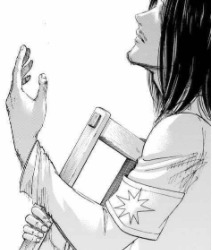
How does one find freedom in a cruel and cynical world? What does freedom even mean? What would it feel like? How will we know when we see it? These have been recurring questions throughout this story. We seem to explore attempts at the answer to this question through the perspective of characters.

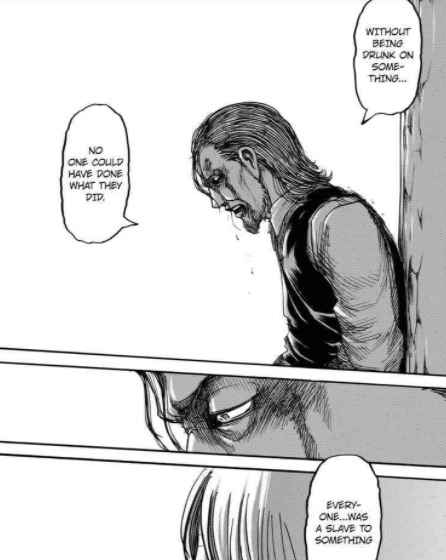
Kenny Ackerman’s life in pursuit of power led him to realise a truth about himself and the people around him. this idea of being drunk on something. That People need something to believe in to keep them going, to keep them from being broken by life’s suffering. Something that they hope gives each of their lives meaning. Each character’s pursuit towards this idea is what they believe will give them freedom from suffering.
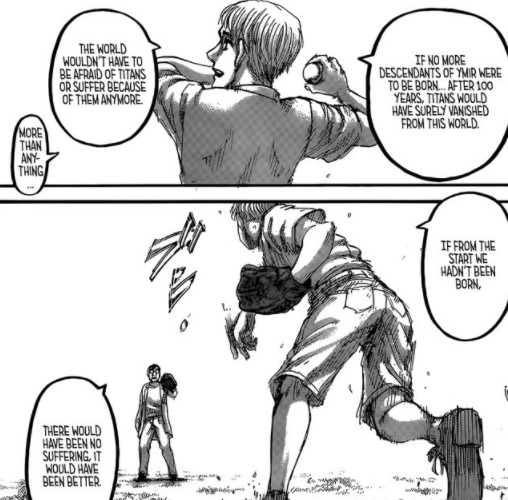
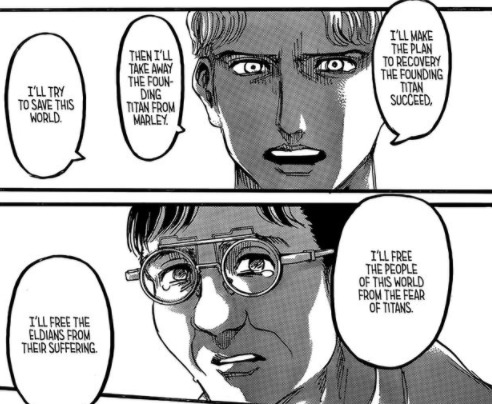
Zeke was no exception to this, he sees the suffering he experienced as a suffering inherent in being an Eldian in this world. He was drunk on the idea that his and the collective suffering would stop if Eldians ceased to exist.

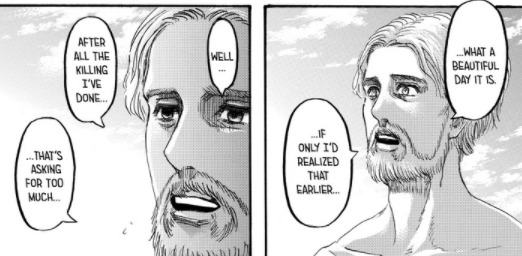
Despite this proposition, Zeke was able to find true freedom not by pursuing his personal mission through to the end but by letting it go. This push to move forward: to explain himself, his life, his suffering. It has brought him only more dissatisfaction and pain. He kept moving forward and when Eren took power from Ymir he was just sitting inert in Paths. It is not until his conversation with Armin that he truly looks back and reflects. Armin talks about a time where he was just having an aimless moment shared between loved ones. Zeke looks within and finds himself playing catch with Xaver. It has no meaning but it is a moment in his life where he’s not suffering but nor is he striving to push forward with some grand purpose. He is simply… existing. Without complication. Without justification. He is just someone who exists in this world because he was born into it. A simple moment with a profound effect: that life has intrinsic value and purpose regardless of how cruel it may seem. Zeke has now found that peace he was looking for his entire life. That feeling stays with him right up to the moments of his death. He can’t take back all the blood he has shed but for a few moments to take in the clear sky of the day. He can just exist.
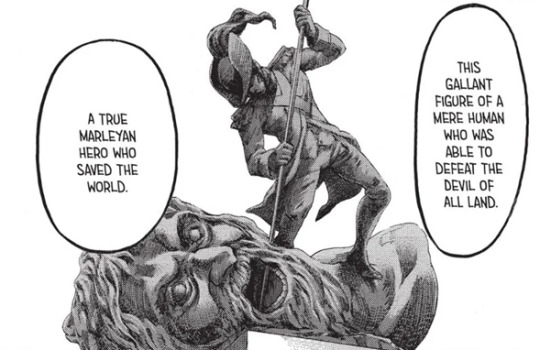
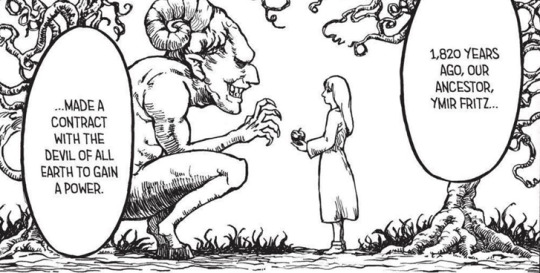

There has been an exhaustive debate in and out of the story of who or what the true devil of humanity is supposed to be. The devil of all earth that plagues humanity. I don’t believe it is Eren but I do believe he is the person in the story most seduced by it. I put forward that the devil of humanity isn’t a person born once in a generation, it is not a creature or some sort of supernatural force. The devil of humanity is the cycle of violence itself. A tiny glimmer of light or fear of the dark that pushes us into war, into chaos, into hell.
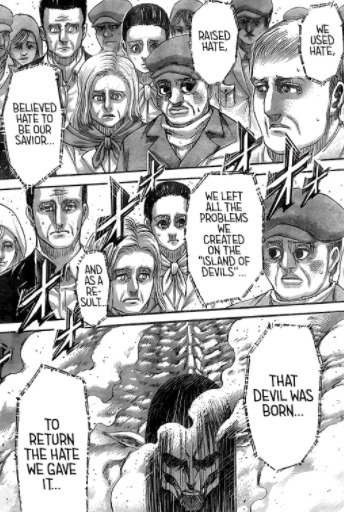
We may believe we see something beyond it. Something we can gain or something we fear will be taken from us if we don’t answer the call: “Do this and your dream will come true, you will be safe, you will be loved, the pain will stop” Just once. Then once again. Then once more. Before you know it, you are gripping the wheel of a sinking ship so heavy you have no hope of turning it on your own. But that may be the very thing that can stop it. Hope. The hope you give yourself in small acts of faith. Kindness. Compassion. Empathy. Seeing beyond the walls that trap your spirit. Not to seek out freedom taken from you but to reconnect with the freedom you always had that never left, your humanity.


If this is Isayama’s message, that freedom is in finding one’s humanity. One finds freedom by reconnecting with their humanity. I put forward that the most free person in this story has been Mr Blouse, Sasha’s father.
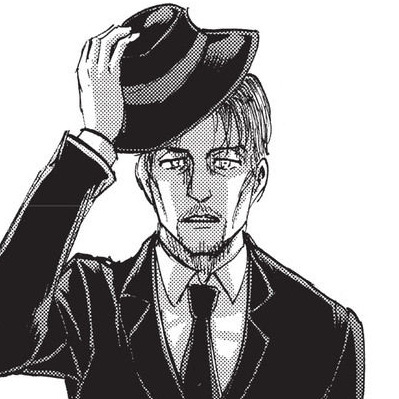
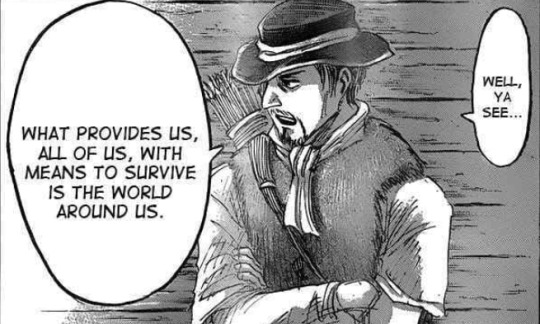
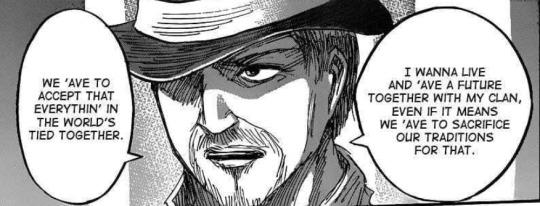

Mr Blouse is the person in the story most consistently connected to his own humanity and humanity as a collective whole. He makes it a principle to stay connected to it. So much so that when given a justifiable choice to take revenge on Gabi for killing his daughter. He instead chose to forgive her and console both her and Niccolo showing her the most humane act she had ever received. She did not have to justify her existence as a good Eldian in that moment, she was accepted as another person who deserved to exist even if she’d made mistakes.

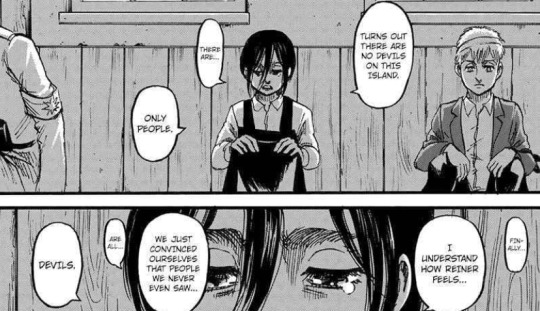
From Gabi’s experience and perspective, nothing made more sense than Mr Blouse killing her for what she did. What he decided to do was so simple yet its impact was profound. He reached Gabi because he saw something real beyond answering hate with hate. He sees a precious freedom beyond this cycle, and now thanks to what he did Gabi can see beyond it too and was able to find her humanity.
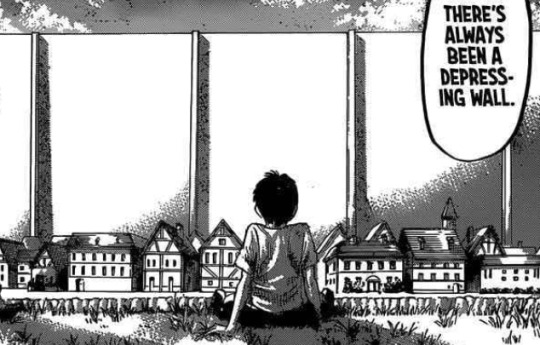
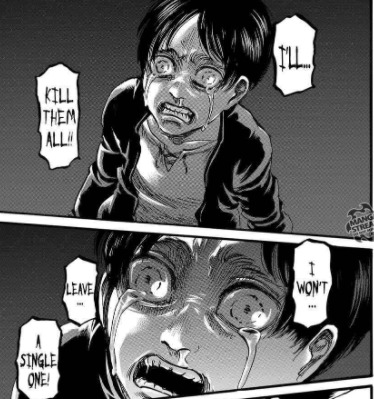
How does this relate to the main character of the story, Eren. Eren’s case is a very tragic one. No one is more emotionally attached to the idea of freedom than Eren, it has a specific imprint within his psyche. However there also lies the imprint of the wall within his psyche and all the trauma associated with it. From an early age Eren, at his most traumatised, found a resolve to find freedom from this horrific nightmare by destroying those who took his freedom from him at any cost. But in finding this resolve and trusting it above anything else, he had unknowingly damned himself.


The wall is so strongly associated with trauma in Eren’s mind, and now with the release of the wall titans, he is literally weaponizing his trauma and aiming it at the rest of the world. Yams is establishing that humanity is the only real freedom we have and Eren had always expected freedom to be beyond the walls. However, because of Eren’s compounded trauma, humanity is the ultimate enemy. In sacrificing his humanity and wiping all of it from the outside world, he is destroying the freedom he wanted for himself and for everyone in the world.
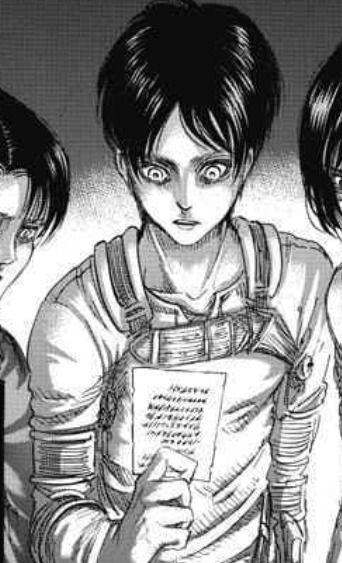
This happens all in the basement of his old home in Shiganshina. Eren was on the cusp of moving beyond his trauma when suddenly all of that pain, all of those triggers were reformatted, given new context when he learned the truth of his world. Why all of this pain and suffering happened to him. Once he met the formative father of his new world rebirth – Eren Kruger.


Eren has found stability in this turmoil by latching onto Kruger’s mindset, believing Kruger to embody what he needs to be to save those he cares about. In this new large and scary world, Eren sees Kruger as the person he will have to be to exist, to make a change. Eren has assimilated Kruger into his identity, evident from Eren taking Kruger’s name during his time spent in Marley. In how we are introduced to him post time skip, Eren is pursuing action using Kruger’s words to young Grisha about the Zeppelin.
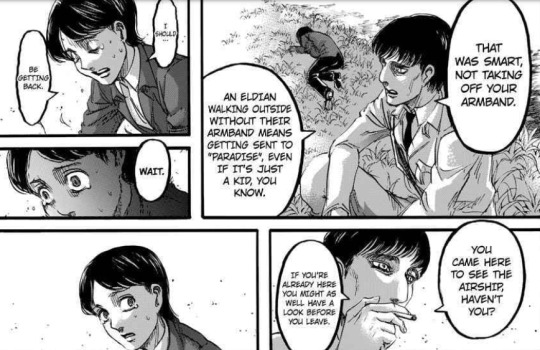
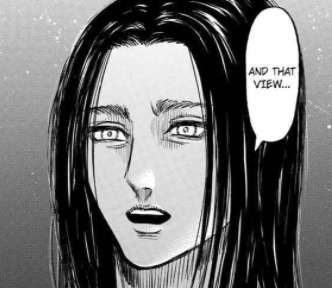
Freedom is hard fought and after fighting tooth and nail and suffering and pushing as hard as he can, he will have his freedom.
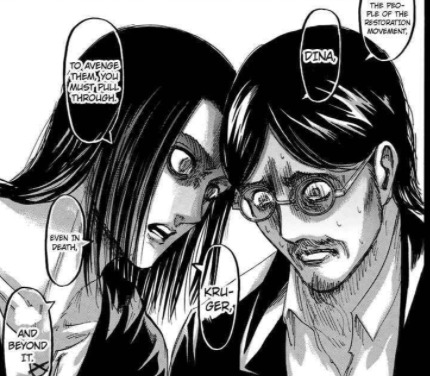

Culminating in the Jaeger trio at the Reiss family cave, we finally see how far Eren’s resolve has pushed him. Eren is not the devil but he is the one most seduced by it (pushing forward the cycle of violence). He tells Grisha to do this to justify his own belief that this was necessary. To sacrifice his humanity, the humanity he managed to find in the walls after a life of pain and anger as soldier of revolutionary radicalism. For Eren, sacrificing one’s humanity is what is necessary. But Eren misunderstood what he was supposed to take away from Kruger’s life.



There is an additional meaning behind Kruger’s final words to Grisha – in sacrificing his humanity to get to this point, he has lost everything precious to him. All that exists is the end goal, the zeppelin. Seeing the zeppelin is… all there is. It won’t give you back what you lost or what you have told yourself you need to take back: aka your humanity. Eren’s “sight” is the zeppelin and he believes seeing it will give him back the freedom taken from him. It’s no coincidence that Grisha looks like Eren when he reflects on the day that traumatised him the most.
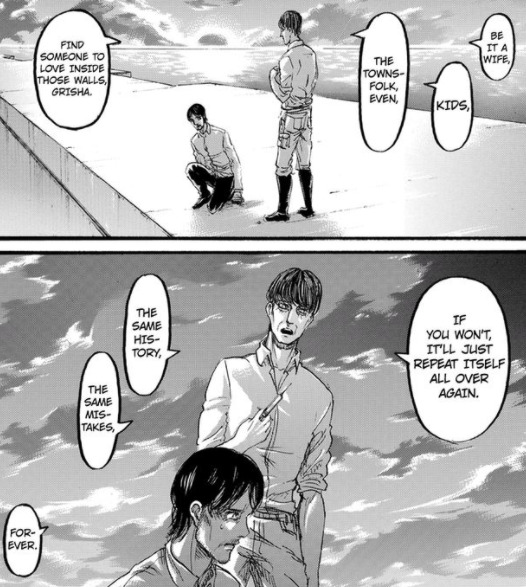
We see Kruger talking to Grisha further after he is given his mission. As Kruger prepares the serum for Grisha he mentions that he won’t know who will be watching this memory. If we take the ironic nature of this story into consideration, this can also mean that he doesn’t know if whomever is watching these memories will stop watching before he is about to say what he says. It takes place at the end of the chapter after we see Eren finding his new resolve and coming to grips with what he has learned and what he needs to do. This may be implying that this further discussion between Kruger and Grisha is something that Eren didn’t actually see. Kruger’s final important message to Grisha is to love someone. Be it a wife, a friend, the people around you. In specific terms, treasure your humanity and preserve it no matter what happens. Like Mr. Blouse, treasure the humanity found in others, even in enemies who have wronged you or may wrong you. Because that is what it means to find life intrinsically valuable. That is the only way to end this cycle of violence and ironically what Kruger has realised after losing so much of his own and now Eren in turn.


So if the path to freedom is to find one’s humanity does this mean that the cycle of violence can be wiped out and the devil of humanity will stop plaguing the world? I don’t think that’s a question Yam’s is capable of answering nor does he intend to.

However, I think he may propose that if it is possible for the main character of the story, the one who has been the most seduced by the cycle of violence and spilled the most blood is able to give himself back his humanity after willingly sacrificing so much of it. Then there is hope for anyone of us to find true freedom. Not everyone, but anyone. Because not just knowing but realising that we are all human, and valuing that, is what makes us truly free.
#snk 137#aot 137#snk theory#snk Eren#Eren#Eren Jaeger#Zeke Jaeger#Kenny Ackerman#Armin#aot meta#snk meta#Willy Tybur#aot theory#Sashas dad#Paradis#Ymir Fritz#Ymir#Paths#snk paths#Eren Kruger#Kruger#snk niccolo#Grisha Jaeger#Gabi#Snk Gabi#Gabi Braun#snk freedom
263 notes
·
View notes